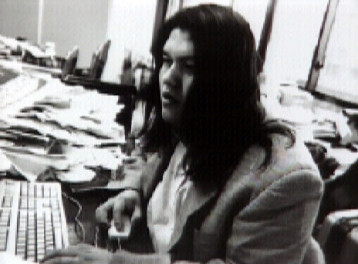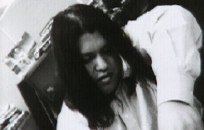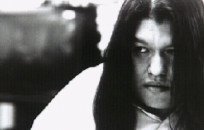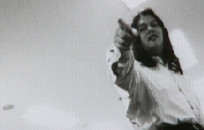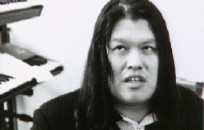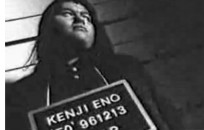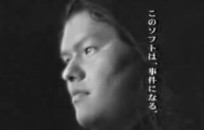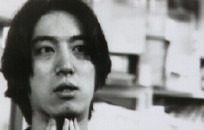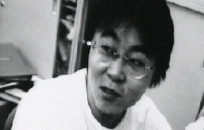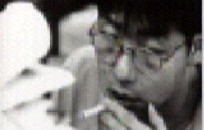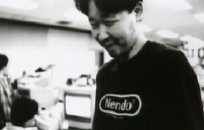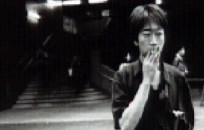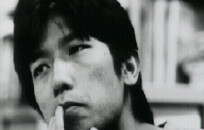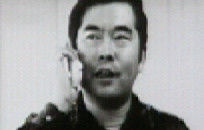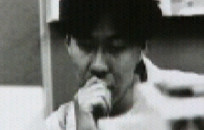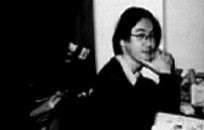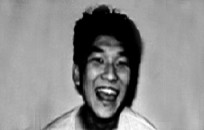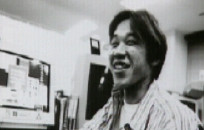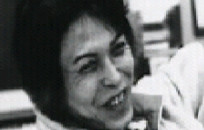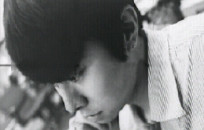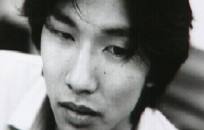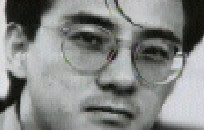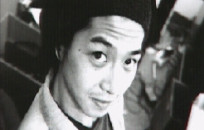Kenji Eno
Feel the different culture
on the backside of the Earth

COREgaming
- 21 / 08 / 08
III. BLISS
INTERVIEW WITH KENJI ENOAfter eight years since his last Dreamcast title, Eno returns at last with the announcement of a new videogame project. A precious example of his recent work can already be seen in the game NEWTONICA, to which he contributed with abstract visual concepts and a sugestive background music theme.
Avoiding the subject of his new game on purpose, out of respect for the author's silence, I tried to make this an easy going, informal interview that plays like a dialogue, covering other subjects than those already featured elsewhere.
I deliberately kept his answers as intact as I could so that the reader, too, could understand a little more about Eno’s mind. Needless to say that it was a privilege, from my end, to be able to exchange information, ideas and thoughts with one of the greatest videogame icons of all time.
-------------------------------------------------------------
Kenji Eno working on ENEMY ZERO at the extinct WARP studios.
COREGAMERS : The other day I was exchanging some emails with (your friend) Kenichi Nishi, whose independent projects, much like the greater part of your work, are impossible for a non-japanese speaking player to understand due to the language barrier. Given this situation; did you ever think about the fact that European players were constantly being left behind?
Kenji Eno : Yes and no. For example, Warp's 1st major title, D, has 4 languages: Japanese, English, French and German. Despite being only four languages, that was heavy to me, because I can't understand French and German - almost nothing. But I had to check them, not only texts, but the voices too.
I know more and many languages in the world. I think that I want my games to be played by as many people as possible.
I remember when I was young, I watched French movies in my video player. Because there were no subtitles, I felt sad. I think I have to ponder on this problem, thanks.
CG : One can clearly understand from your position in life and in the world of game design, that you are a non-conformist: as a unique means of communication, what do you think videogames have to offer that no other medium can deliver?
KE : Interactivity.
CG : You were one of the pioneer game designers for 3DO in Japan, a country where there was little room for another console among the Nintendo-dominated market. In the opinion of some videogame researchers and specialists, the 3DO system isn't just a colossal market failure: it is the most sacred example of Hawkin's visionary intention to unify the videogame market, with only one system being produced by different manufacturers. One of the 3DO hardware creators, RJ Mical, once said that the project seemed like "almost an utopian Socialist idea".
What are your thoughts on the subject of a universal game system as an abstract idea, as well as in the light of modern day 'console wars'?
KE : Like you said, 3DO had a good vision. That's one of the reasons why I created the games for 3DO. I love Trip Hawkins, he’s now on Digital Chocolate. I wanna see him again.
But about “console wars”, I think it is difficult to understand and I think it’s much like ‘Star Wars’ – because this movie has more than just one director. There are various platform companies, different game players and many people in this industry. This “war” helped to make and still originates good consoles, you know. We can vote: to buy.
CG : I assume that as an experienced game designer, you must also play a great deal of games not only as a learning process, but for the pleasure of the experience. But since you're a renowned creator, you must have a very different perspective on the games that you play in comparison to the average game player. From a personal and professional standpoint, which were the games that you played so far that best display videogame excellence and why?
KE : First of all, I am a video game creator. (Yet) I am a video game player when I play the game. I may have different perspective on the games, but every player has one, I think.
Some game creators think about game design while they play the game, But I don't. I just play. I just enjoy. About the games I played so far that best display video game excellence… many games!
I can give you the three titles that made me a videogame creator.
SPACE INVADERS / Taito / Arcade
First big impact of video game to me. I was addicted to it. I felt some kind of new culture appear.
PACMAN / Namco / Arcade
First video game, I felt the "art". Like "pop art". Visual, sound and program. So beautiful.
TRANSYLVANIA / PolarWare / PC
First video game, I felt like I was there. I really enjoyed being a part of an adventure. If I didn't play Transylvania, I couldn't create D.
CG : You named two of the first and best examples of videogame in the form of arcades (Invaderu and PakuMan). But, as we know today, this sort of entertainment is becoming secondary as people around the world prefer to meet up in virtual reality through online gaming than to actually go out and meet in the arcade parlor, play head to head. How do you feel about the decay of the Arcade gaming age?
KE : I loved the experience of playing arcade games. But that was a long, long time ago when I was 9 or 10. I used to play the arcade games in the dark rooms in Japan.
So dark.
Little Dangerous.
There's many adults, and only a few kids like me. Smoke.
Drink, Drank. Chat.
Sounds from game machines.That's the culture I loved. Online games? - Too much different.
CG : One of the fondest memories I have from your WARP games, like D and ENEMY ZERO, was that you always emphasized the creators behind the program. Instead of a boring credits roll, these games had a slideshow of the names with pictures and music. As you may have realized, that initiative was very important to players like me, who had always wanted to know a little more about what happens backstage. To what extent do you think is important for videogame authors to come out and assume their work, much like musicians or filmmakers take credit for their albums and movies?
KE : When I was creating first major title D, neither I nor and WARP were famous. Nobody knew me. If no success, I had to close. D was my 1st and last game where I was like gambling while creating.
But there was no famous character. It was not a sequel, and not a conversion title. There was not much money to do marketing. There were no ways for me to make game players aware unless I said something (about me) in the games.
After CD ROM became dominant media, instead of cartridge (cassette) ROM, there’s a new “world” and more stories growing within videogames: these worlds are what the creators deliver.
I think it's the good way to understand what creators want before playing.
CG : Videogame creation is a daily process of team work. But you seem to have, on more than one occasion, played different roles in the production of your games, from game planning to musical score creation. At the point when you put up your sleeves and immerse yourself in your work what, do you think, are your greatest traits as a videogame creator?
KE : Every time I do what I can do. That's all.
For example, ENEMY ZERO, I asked (1) Michael Nyman to compose. Because I felt he's the best musician for what I was looking for in ENEMY ZERO.
In REAL SOUND, I asked Keiichi Suzuki, who had created the soundtrack for the game MOTHER (EARTHBOUND), to compose and Yuji Sakamoto to write the script.
I am a producer. I ask myself to perform a certain work if I’m the best person to make that part of the game.
CG : Looking back at your career so far, I understand you always regarded your job more like an artist with a personality than an engineer caught up by the numbers and code. Also, your creative power felt less restricted when you were able to found your own studio and realize your subjective vision. With those games you created autonomously, free from corporate restrictions and pressures, what do you think you have accomplished - and what do you still hope to accomplish with your future projects?
KE : I want to see what I can do with video games. Just that.
Because after 2000, I did may works outside video games: planning, Graphic Design, Compose, Consulting, Branding, Concept Design and Marketing. I did this for many Clients.
I had many experiences. And I have two children now. I've aged. Some of me has changed. Some of me is the same. I want to see what I can do with video games now.
You don’t?
CG : Indeed I do! So, the big news everywhere is that Kenji Eno is returning to the game scene (!) after many years. Instead of asking you about your new project, I would like to know what did you miss the most during your absence: what is that moment in the process of videogame creation and publishing that makes you feel alive and rewarded?
KE : I feel I am happy that I can create the video game now and again. The greatest reward is to be able to make the game with a good companion. I really thank my friends and my wife. When my son plays my new game in near future, I’ll feel I am alive.
CG : What alternative themes would you like to see inserted into videogames that haven't been so far?
KE : Any style is OK.
But I want to play something new.
And I want to play a game where I can feel the creators.
CG : The logotype for WARP (I always found it brilliant, like a sign of great things to come in a game). Who designed this logo and does it have a specific meaning?
KE : Me and designer "Miyazaki" at WARP made it.
Meaning is so simple!
You see the logo of WARP. There's four screens on four TVs. It's after TV, like a four-frame comic.
W : End of broadcast of TV. There's color-bar.
A : After color-bar, sand noise.
R: Oh, I play the game... is old type game.
P: Boring, Switched off. .CG : I guess everyone asks you about this: In the magazines of the time, D-2 was shown as an M2 project before there was even talk about Dreamcast. I still have the magazines that show the stills from the game. I recall a garden, a character in a silver armour, a bearded man. Those were amazing looking graphics and environments. What sort of game was D-2 (story, characters and the message of the game)?
KE : D-2 for M2 was like an action adventure game. Like Zelda.
I don't wish to reminisce about the story because there's no D-2 for M2. No one can play, even me. (It’s) sad.
CG : My first contact, like so many other players, with D-2 was through the D-2 Shock disk. For the first time I was able to try the game. But what I recall the most about it was the sound test – the music was so calm and distressing at the same time. What sort of feelings do you like to convey when creating music? Besides producing, do you actually play any instruments?
KE : When I compose and create the music for games, I hope the music I compose will become "good BGM" (back ground music) Not just a song.
I often play the piano, keyboards. I played brass instrument when I was young, at a brass band and an orchestra.
CG : Going through your projects so far, I don't think you've ever explored the handheld market properly. What is your position on the concept of handheld consoles - do you not find it interesting?
KE : Too small a screen for me!
CG : Finally, tell me a little bit about your life nowadays. It's got to be exciting, resuming your work as a game designer. What sort of reaction would you like to have this time from the public this time? You also mentioned your kids before: are they old enough to play videogames? Have they tried to play your games?
KE : Any reactions, please.
(To have) no reaction is the saddest.
My older son is 10 years old. He can play. This is the first time he will be able to play my game.
He may understand that I am the designer.
(1) - Translation note: original verb used by Eno was ordered.
The faces of Kenji Eno
Kenji Eno Arrested: Enemy Zero Ad
The Backstage: WARP staff
Sho Tateishi
Hideki Miura
Hirofumi Harashida
Hideki Sudo
Makoto Sakai
Naoya Sato
Hirohide Sugiura
Hiromi Hayashi
Norihiro Yamamoto
Yoshiaki Tonooka
Tomohiro Miyazaki
Takahiro Matsuhira
Takashi Ohtsuki
Fumito Ueda
Eitaro Suzuki
Hirohiko Sugamura
|

